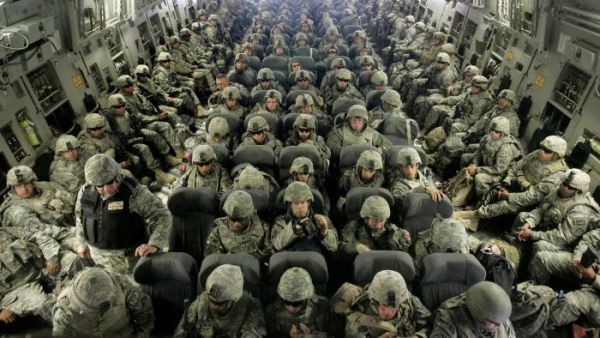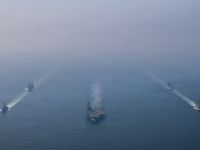The Middle East is saturated with private military contractors (PMCs). The US has been deploying tens of thousands of mercenaries in Iraq since the 2003 invasion, Russia has members of the Wagner group deployed in Syria and Libya (it can be assumed that PMCs are currently being geared up for work in Belarus), and Turkey and GCC states are relying on mercenaries to carry out their political agendas.
It has generally been assumed that PMCs are the result of a mixture of neoliberal outsourcing partnered with the need for political deniability. However, private companies and private armies built, to a very real extent, the world we now live in. The spheres within which PMCs operate tend to be those same spaces once occupied by colonial powers.
However, private companies and private armies built, to a very real extent, the world we now live in.
This genealogy can be traced to the East India Company and the state-sponsored exploitation of land and peoples by imperial Britain. If we follow this line, then are we able to reckon with the true nature of PMCs so that we may connect the work being done by mercenaries in warzones throughout the Middle East today. This can be done by focusing on one PMC, in particular, that is the subject of a new book, Keenie Meenie Services: The British Mercenaries Who Got Away with War Crimes, by the journalist Phil Miller.
As many countries entered the post-colonial historical moment, European powers sought new ways of maintaining their political connections to groups who had taken control of certain nations. For example, France maintained close ties with the ruling Christian groups in Lebanon and Britain sought to maintain relations with newly independent India.
In order to maintain influence, military support was provided by mercenaries. One such British company, Keenie Meenie Services (KMS), operated around the world, often in states experiencing civil war. Phil Miller spoke to Al Bawaba News about the newly uncovered history of KMS.
One such British company, Keenie Meenie Services (KMS), operated around the world, often in states experiencing civil war.
The root of the name ‘Keenie Meenie’ is rumoured to have a few different origins, but one includes an Arabic phrase referring to covert operations.
“A lot of the people Keenie Meenie recruited were ex-SAS and had served in Oman, particularly in the Dhofar war,” Miller told Al Bawaba. “The chairman of the company had been a SAS squadron commander and when he left the SAS, he went on to run a covert war in Yemen during the North Yemen Civil War in the 1960s in which tens of thousands of people were killed. He did that with the blessing of MI6. It was afterwards that he set up KMS.”
Some of the work that KMS undertook was diplomatic protection, including in Beirut and also for the Saudi oil minister. The most lucrative work in the region they took part in that Miller is aware of was in Oman where they trained the Sultan of Oman’s special forces. “This unit was set up and commanded by Keenie Meenie personnel. The people who worked for KMS at the time include the current defence minister of New Zealand, Ron Mark,” Miller told Al Bawaba. The unit was set up in response to continued uprisings against the British-backed Sultan.
“A lot of the people Keenie Meenie recruited were ex-SAS and had served in Oman, particularly in the Dhofar war”
The work supported British interests and contracts were often gained through connections to the British state. The so-called ‘White Sultan of Oman,’ Timothy Landon, who helped to secure Qaboos bin Said’s reign, was an associate of KMS and one of the most powerful people in Oman at the time.
In one of the most egregious instances of crimes committed by the company, Miller has uncovered substantial evidence that employees of the company helped to kill thousands of Tamil civilians during the Sri Lankan civil war.
Keenie Meenie Services stopped trading in the 1980s, but another company ran out of the same offices in London until 2018. This new company, Saladin Security, took over old KMS operations in Oman.
Miller told Al Bawaba that KMS “showed what PMCs could get away with, particularly with their work in Sri Lanka and Nicaragua [where they allegedly blew up a hospital] where they were involved in military operations and terrorism.”
There were efforts in the 1980s in the UN to have a ban on the use of mercenaries, but the UK didn’t sign up to it. What we have now is these voluntary codes of conduct and professional associations that are supposed to regulate their members own conduct. It’s all fed into a process of immunity and self-regulation.”
What we have now is these voluntary codes of conduct and professional associations that are supposed to regulate their members own conduct. It’s all fed into a process of immunity and self-regulation.”
“A close parallel with KMS is what Spear have been doing in Yemen, they are an American PMC. There certainly are similarities with the Wagner Group. It’s interesting that the UK government has criticised Wagner, yet the UK has opposed efforts to ban the use of mercenaries because the finds them convenient,” Miller told Al Bawaba.
After visiting the Foreign Office building in London where memorabilia of the East India Company is still proudly displayed, Miller realised that the culture of using PMCs is still at the front of British policy abroad. “The British Empire was created by mercenaries, so they are still very much put on a pedestal. In the British Foreign Office, where the diplomats work, it is deeply embedded into the culture of foreign policy as a means of projecting influence in a deniable way.”







